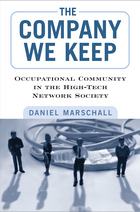
At the birth of the Internet Age, computer technologists in small, aggressive software development companies became part of a unique networked occupational community. They were creative, team-oriented, and enthusiastic workers who built "boundaryless careers," hopping from one employer to another.
In his absorbing ethnography The Company We Keep, sociologist Daniel Marschall immerses himself in IntenSivity, one such technological workplace. Chronicling the employees' experiences, Marschall examines how these workers characterize their occupational culture, share values and work practices, and help one another within their community. He sheds light on the nature of this industry marked by highly skilled jobs and rapid technological change.
The experiences at IntenSivity are now mirrored by employees at Facebook and thousands of other cutting-edge, high-tech start-up firms. The Company We Keep helps us understand the emergence of virtual work communities and the character of the contemporary labor market at the level of a small enterprise.

Moral theologians, defense analysts, conflict scholars, and nuclear experts imagine a world free from nuclear weapons
At a 2017 Vatican conference, Pope Francis condemned nuclear weapons. This volume, issued after the 60th anniversary of the Cuban Missile Crisis, presents essays from moral theologians, defense analysts, conflict transformation scholars, and nuclear arms control experts, with testimonies from witnesses. It is a companion volume to A World Free from Nuclear Weapons: The Vatican Conference on Disarmament (Georgetown University Press, 2020).
Chapters from the perspectives of missile personnel and the military chain of command, industrialists and legislators, and citizen activists show how we might achieve a nuclear-free world. Key to this transition is the important role of public education and the mobilization of lay movements to raise awareness and effect change. This essential collection prepares military professionals, policymakers, everyday citizens, and the pastoral workers who guide them, to make decisions that will lead us to disarmament.
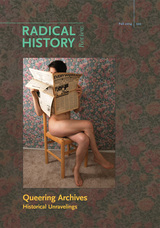
This issue explores the evolution of grassroots LGBT archives, debates over queer migrations, nationalism and the institutionalization of LGBT memory, the archiving of transgender activism, digitization and the classificatory systems of the archive, performances of the colonial archive, museums as archives, and everyday objects as archivable texts.
Daniel Marshall is Senior Lecturer in the Faculty of Arts and Education at Deakin University, Melbourne. Kevin P. Murphy is Associate Professor of History at the University of Minnesota and a member of the Radical History Review editorial collective. Zeb Tortorici is Assistant Professor of Spanish and Portuguese Languages and Literatures at New York University.
Contributors: Rustem Ertug Altinay, Anjali Arondekar, Elspeth H. Brown, Elise Chenier, Howard Chiang, Ben Cowan, Ann Cvetkovich, Sara Davidmann, Leah DeVun, Peter Edelberg, Licia Fiol-Matta, Jack Jen Gieseking, Christina Hanhardt, Robb Hernandez, Kwame Holmes, Regina Kunzel, A. J. Lewis, Martin F. Manalansan IV, María Elena Martínez, Michael Jay McClure, Caitlin McKinney, Katherine Mohrman, Joan Nestle, Mimi Thi Nguyen, Tavia Nyong’o, Anthony M. Petro, K. J. Rawson, Barry Reay, Juana María Rodríguez, Don Romesburg, Rebecka Sheffield, Marc Stein, Margaret Stone, Susan Stryker, Robert Summers, Jeanne Vaccaro, Dale Washkansky, Melissa White
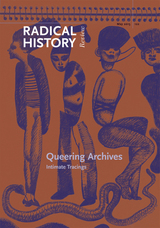
This issue considers how archives allow historical traces of sexuality and gender to be sought, identified, recorded, and assembled into accumulations of meaning. Contributors explore conundrums in contemporary queer archival methods, probing some of them in essays on the Catholic Church and the Church of Jesus Christ of Latter-Day Saints. This issue also includes a series of intergenerational interviews reflecting on histories of LGBT archives, a roundtable discussion about legacies of queer studies of the archive, and a closing reflection by Joan Nestle, a founding figure in the practice of international queer archiving.
Daniel Marshall is Senior Lecturer in the Faculty of Arts and Education at Deakin University, Melbourne. Kevin P. Murphy is Associate Professor of History at the University of Minnesota and a member of the Radical History Review editorial collective. Zeb Tortorici is Assistant Professor of Spanish and Portuguese Languages and Literatures at New York University.
Contributors: Rustem Ertug Altinay, Anjali Arondekar, Elspeth H. Brown, Elise Chenier, Howard Chiang, Ben Cowan, Ann Cvetkovich, Sara Davidmann, Leah DeVun, Peter Edelberg, Licia Fiol-Matta, Jack Jen Gieseking, Christina Hanhardt, Robb Hernandez, Kwame Holmes, Regina Kunzel, A. J. Lewis, Martin F. Manalansan IV, María Elena Martínez, Michael Jay McClure, Caitlin McKinney, Katherine Mohrman, Joan Nestle, Mimi Thi Nguyen, Tavia Nyong’o, Anthony M. Petro, K. J. Rawson, Barry Reay, Juana María Rodríguez, Don Romesburg, Rebecka Sheffield, Marc Stein, Margaret Stone, Susan Stryker, Robert Summers, Jeanne Vaccaro, Dale Washkansky, Melissa White
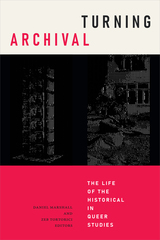
Contributors. Anjali Arondekar, Kate Clark, Ann Cvetkovich, Carolyn Dinshaw, Kate Eichhorn, Javier Fernández-Galeano, Emmett Harsin Drager, Elliot James, Marget Long, Martin F. Manalansan IV, Daniel Marshall, María Elena Martínez, Joan Nestle, Iván Ramos, David Serlin, Zeb Tortorici
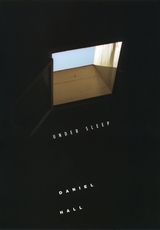
Then
You looked up vaguely
or you didn’t—even the memory
is dying. Then you whole body
breathed out, and the argument ended.
Heaven surfaced about you
like a glass tabletop, hard
and cold. Whatever you do
don’t turn me into poetry. Sorry:
I am done crying about it
but I am not done crying.
An extended meditation on how death affects those left behind, Under Sleep is a skillfully understated, beautifully rendered elegy for the poet’s partner. Formally inventive and technically sophisticated, Daniel Hall attends to the power of death to haunt every perception. The poet’s voice registers as though he were walking on the bottom of the ocean, in a state of mind somewhere “under sleep,” in a kind of waking dream. In Hall’s hands, isolated moments of perception bloom into truly touching love elegies.
The poems in Under Sleep were written over a period of ten years and, as a result, are densely interconnected, with lines and entire stanzas transplanted between different poems. Using styles ranging from free verse to sonnets, Sapphics, and rhymed haikus, Hall populates the book with literary and historical figures—Baudelaire, Pound, and Casanova—in poems set in China, the Middle East, Death Valley, and Italy. Throughout, the poetry is propelled by tension as the speaker struggles with his own better judgment—and against his lover’s wishes—to turn the loss of the beloved into art.
Praise for Daniel Hall
“Daniel Hall’s work reminds us that a poet’s sharp-sightedness, the whole business of ‘getting things right,’ is a matter of far more than accuracy. It’s a matter of—inescapably—thanksgiving.”—Brad Leithauser, New York Review of Books

This edited volume, based on papers presented at the 2017 Georgetown University Round Table on Language and Linguistics (GURT), approaches the study of language variation from a variety of angles. Language variation research asks broad questions such as, "Why are languages' grammatical structures different from one another?" as well as more specific word-level questions such as, "Why are words that are pronounced differently still recognized to be the same words?" Too often, research on variation has been siloed based on the particular question—sociolinguists do not talk to historical linguists, who do not talk to phoneticians, and so on. This edited volume seeks to bring discussions from different subfields of linguistics together to explore language variation in a broader sense and acknowledge the complexity and interwoven nature of variation itself.
READERS
Browse our collection.
PUBLISHERS
See BiblioVault's publisher services.
STUDENT SERVICES
Files for college accessibility offices.
UChicago Accessibility Resources
home | accessibility | search | about | contact us
BiblioVault ® 2001 - 2024
The University of Chicago Press









